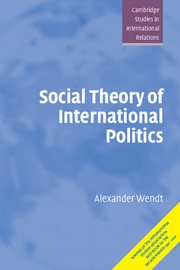Book contents
- Frontmatter
- Contents
- Acknowledgements
- Dedication
- 1 Four sociologies of international politics
- Part I Social theory
- 2 Scientific realism and social kinds
- 3 “Ideas all the way down?”: on the constitution of power and interest
- 4 Structure, agency, and culture
- Part II International politics
- Bibliography
- Index
- Miscellaneous Endmatter
2 - Scientific realism and social kinds
Published online by Cambridge University Press: 05 September 2012
- Frontmatter
- Contents
- Acknowledgements
- Dedication
- 1 Four sociologies of international politics
- Part I Social theory
- 2 Scientific realism and social kinds
- 3 “Ideas all the way down?”: on the constitution of power and interest
- 4 Structure, agency, and culture
- Part II International politics
- Bibliography
- Index
- Miscellaneous Endmatter
Summary
How is it possible to adopt an idealist and holist ontology while maintaining a commitment to science, or positivism broadly understood? This chapter constructs the “via media” that grounds my modernist constructivism.
The state and states system are real structures whose nature can be approximated through science. Acceptance of this proposition entails “scientific realism” (in this chapter simply “realism”), a philosophy of science which assumes that the world exists independent of human beings, that mature scientific theories typically refer to this world, and that they do so even when the objects of science are unobservable. Theory reflects reality, not the other way around; as realists like to say, they want to “put ontology before epistemology.”
Most IR scholarship, mainstream and critical alike, seems to presuppose these assumptions, which means that most IR scholars are at least tacit realists. When they make their philosophical views explicit, however, they often take anti-realist positions. An exchange in 1985 among prominent mainstream IR scholars on matters of philosophy of science featured apparent consensus on the empiricist view that in order to be scientific explanations must ultimately be deductive in form, a characteristic form of anti-realism. The dominance of empiricist philosophy of science in IR is being challenged today by another strand of anti-realism, “post-positivism,” in what has become known in IR theory as the Third Debate. Throughout this debate references to realist philosophy of science have been remarkably rare, David Dessler's work being a notable exception.
- Type
- Chapter
- Information
- Social Theory of International Politics , pp. 47 - 91Publisher: Cambridge University PressPrint publication year: 1999
- 2
- Cited by



